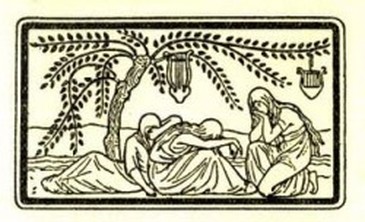 By the waters of Babylon, there we sat down and wept, when we remembered Zion. On the willows there, we hung up our harps. For there our captors required of us songs, and our tormentors, mirth, saying, “Sing us one of the songs of Zion!” Psalm 137: 1-3 When the Israelites were exiled to Babylon, after witnessing the destruction of the Temple and of Jerusalem, they hung up their harps on the “willows” beside the Euphrates because they were bereft of hope that they might return to Jerusalem or find voice to sing the songs of home. The Hebrew word for willow is aravah, generally translated as “willow of the brook.” Heavy users of water, willows grow along streams in the Jordan valley. However in Psalm 137, the “willows” by the waters of Babylon under which the Israelites wept are actually the Euphrates poplar, native to Iraq. Our beautiful Biblical Garden willow, with its purple stems and bluish foliage, is Salix purpurea, Arctic Willow, which is better suited to New England winters. Rabbi Nachman of Bratslav commented on Psalm 137, “Everywhere I walk, I am walking to Jerusalem.” The name Jerusalem means “city of wholeness, or completeness.” In 539 BCE, Persian King Cyrus the Great conquered Babylon and the exiled Jews began to return. Despite our messy lives and our troubled world, we too can return to Jerusalem, even if we have never been there. Jerusalem moments come when we recognize that we are whole and complete, if imperfect, just as we are, and that wherever we find ourselves, we are exactly where we should be. They may not come along very often, and they are easily overlooked, nonetheless, they are valuable breathing-spaces in which we can pause and listen to our inner voice, and reconnect with who we truly are. |
AuthorsMichael Schlesinger is Temple Sinai’s Biblical Gardener. Mike has been gardening since he was eight years old. He used to grow grape vines and make wine when he lived in California. He now tends to our garden, continuing the traditions started by Catherine Walters. Archives
March 2020
|

Affiliated with the Union for Reform Judaism
30 Hagen Avenue • Cranston, RI 02920 • 401-942-8350 Office: dottie@templesinairi.org Rabbi Jeffrey Goldwasser: [email protected] |
Want to sign up for the weekly Sinai Scroll email?
Click here to receive weekly updates on Temple services, events and a message from the Rabbi. |


